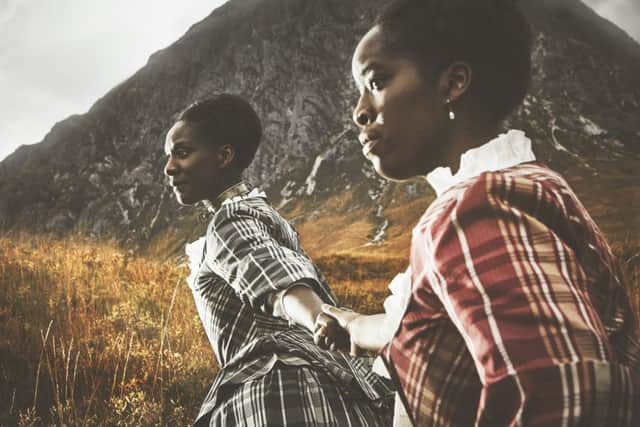Exposing Scotland’s historical links to slavery


The dramatic scene begins 1745, the award-winning 18-minute short film starring sisters and actors Morayo and Moyo Akandé, daughters of Nigerian immigrants and who grew up in Glasgow, to be shown ahead of all screenings instead of adverts at the Edinburgh Filmhouse to mark Anti-Slavery Day 2019 next Friday.
The film sees the sisters, with metal slave collars engraved with their master’s name round their necks, chased and hunted down.
Advertisement
Hide AdAdvertisement
Hide AdThe film gradually reveals the complexities of the relationships between the sisters, Rebecca (played by Morayo) and Emma Atkin (Moyo), and their master David Andrews (Clive Russell).
Emma is being forced to sleep with her master and has been using it as a means to protect her younger sister from him. Rebecca, unaware of this, feels their lives are no worse than other servants.
Morayo wrote the script of the film, directed by Gordon Napier and produced by John McKay, after spotting an advert from 1745 about a runaway slave called Anne in an old Scottish newspaper in Glasgow’s Mitchell Library.
Sir Geoff Palmer OBE, a human rights activist and Scotland’s first black university professor, said 1745 will help educate a new generation about the realities of Scotland’s active and highly profitable role in the slave trade. “Scotland was completely up to its neck in slavery.
There’s a complete myth that Scotland wasn’t as complicit as England or other countries. That Scotland was peripheral to the trade and torture of human beings and abolished slavery way before other countries. It’s a self-serving view propagated by some historians.”
Palmer is calling for the history of the slave trade and Scotland’s role in it to be on the school curriculum.
Speaking during Black History Month 2019, an annual celebration of black culture celebrated in the UK, US, Canada, Germany and the Netherlands, Palmer added: “I give a lot of lectures and people often come up to me afterwards and say ‘why am I an adult whose been educated and I don’t know anything about this?’”
In a lecture last year Palmer said relative to the population Scots owned more slaves and plantations and had a higher share of the transatlantic trade in plantation goods such as tobacco and sugar than England or most European countries. He also said Edinburgh’s New Town partly owed its existence to slavery as it was “sadly, funded by the enormous profits derived from the enslavement of Africans”.
Advertisement
Hide AdAdvertisement
Hide AdA judgment from the Court of Session in 1687 had ruled that “we have no slaves in Scotland, and mothers cannot sell their bairns”.
However, Palmer said slave owners relied on people’s ignorance of the law. The British Parliament did not abolish slavery until 1838 and slave owners were compensated for the loss of their “human property”.
Theo Coetzer, programme co-ordinator, Edinburgh Filmhouse, said: “1745 is a Scottish story, made in Scotland, and we are screening it before all films on Anti-Slavery Day to provide a way for our customers to engage with Scotland’s past.”